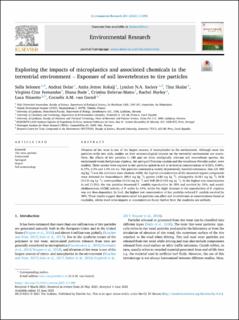Exploring the impacts of microplastics and associated chemicals in the terrestrial environment – Exposure of soil invertebrates to tire particles
Selonen, Salla; Dolar, Andraz; Kokalj, Anita Jemec; Sackey, Lyndon NA; Skalar, Tina; Fernandes, Virginia Cruz; Rede, Diana; Delerue-Matos, Cristina; Hurley, Rachel; Nizzetto, Luca; van Gestel, Cornelis AM
Peer reviewed, Journal article
Published version
Permanent lenke
https://hdl.handle.net/11250/2772286Utgivelsesdato
2021Metadata
Vis full innførselSamlinger
- Publikasjoner fra Cristin - NIVA [2148]
- Scientific publications [1172]
Sammendrag
Abrasion of tire wear is one of the largest sources of microplastics to the environment. Although most tire particles settle into soils, studies on their ecotoxicological impacts on the terrestrial environment are scarce. Here, the effects of tire particles (<180 μm) on three ecologically relevant soil invertebrate species, the enchytraeid worm Enchytraeus crypticus, the springtail Folsomia candida and the woodlouse Porcellio scaber, were studied. These species were exposed to tire particles spiked in soil or in food at concentrations of 0.02%, 0.06%, 0.17%, 0.5% and 1.5% (w/w). Tire particles contained a variety of potentially harmful substances. Zinc (21 900 mg kg−1) was the dominant trace element, whilst the highest concentrations of the measured organic compounds were detected for benzothiazole (89.2 mg kg−1), pyrene (4.85 mg kg−1), chlorpyrifos (0.351 mg kg−1), HCB (0.134 mg kg−1), methoxychlor (0.116 mg kg−1) and BDE 28 (0.100 mg kg−1). At the highest test concentration in soil (1.5%), the tire particles decreased F. candida reproduction by 38% and survival by 24%, and acetylcholinesterase (AChE) activity of P. scaber by 65%, whilst the slight decrease in the reproduction of E. crypticus was not dose-dependent. In food, the highest test concentration of tire particles reduced F. candida survival by 38%. These results suggest that micro-sized tire particles can affect soil invertebrates at concentrations found at roadsides, whilst short-term impacts at concentrations found further from the roadsides are unlikely.

